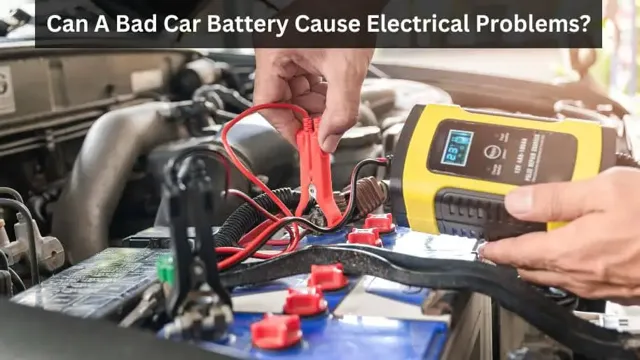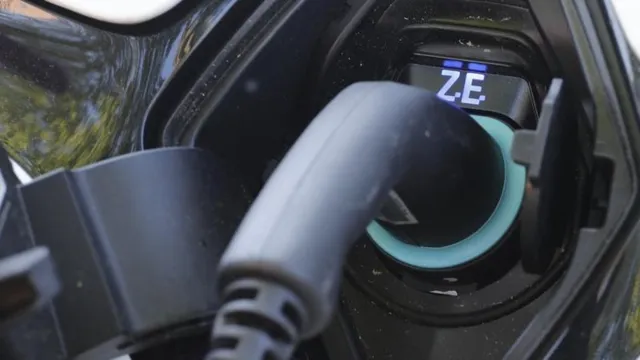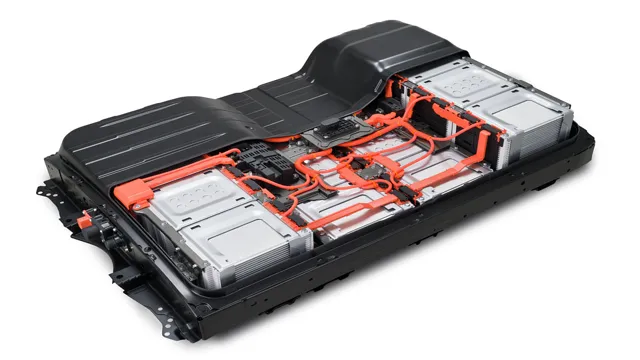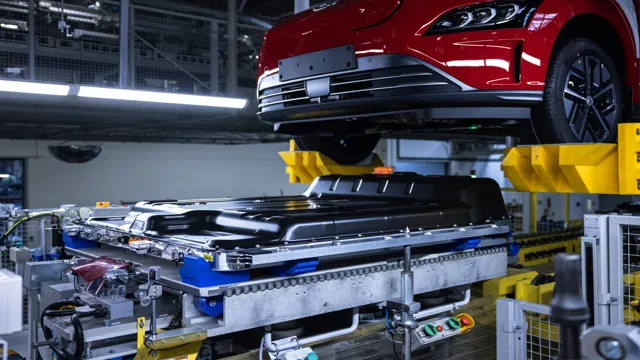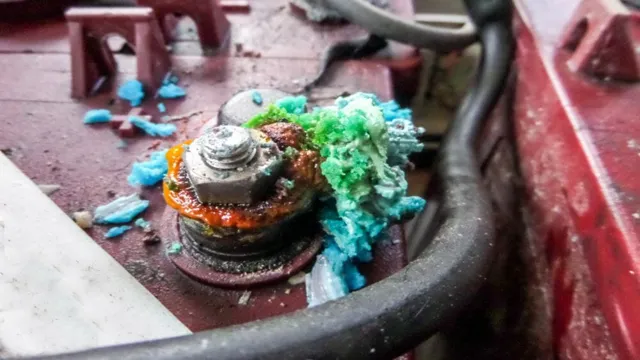Deadly Connection: Can a Dying Car Battery Trigger Electrical Menace?
Have you ever had the misfortune of a dying car battery? It’s a frustrating experience that slows down your day. But aside from the inconvenience, did you know that a dying car battery can also have an impact on your car’s electrical system? The reality is that the electrical system in your car relies heavily on the battery, and when it starts to fail, it can cause various electrical issues that affect your car’s performance. Think of your car’s electrical system as the brain of your vehicle, and the battery as the power source.
The battery provides the initial power to start your car’s engine, and it also keeps the electrical components running when the engine is off. When the battery starts to fail, it can cause a ripple effect throughout the electrical system. Your car may experience dim or flickering lights, the radio may not work correctly, or you may even have trouble starting your car.
It’s essential to understand the impact that a dying car battery can have on your electrical system. Ignoring the warning signs can lead to further damage and potentially expensive repairs. If you notice any electrical issues, it’s best to have your battery and electrical system checked by a professional.
A simple battery replacement may be the solution to avoid more extensive damages. In conclusion, taking care of your car’s battery is vital, not only for the convenience of a reliable starting engine but also for the safety and proper functioning of your vehicle’s electrical system. Understanding the impact of a dying battery can help you identify and address any issues before they become more significant problems.
Remember, a well-maintained battery equals a more reliable and efficient electrical system, therefore ensuring a better overall driving experience.
Symptoms of a Dying Car Battery
A dying car battery can certainly cause electrical problems in a vehicle. If you begin to notice that your car’s headlights are dimmer than usual, or that your radio and power windows are not functioning correctly, this could indicate that your battery is on its way out. Other common symptoms of a dying battery include slow engine cranking, unusual noises when attempting to start the car, and an unusual smell coming from the engine.
If you experience any or all of these symptoms, it’s important to take your car to a mechanic as soon as possible. Ignoring a dying battery can lead to further issues with your vehicle’s electrical system, which could end up costing you a lot more than a simple battery replacement. So, always stay tuned in to your car’s health, and never ignore signs of trouble!
Dimming Lights
Dimming Lights One of the most common symptoms of a dying car battery is dimming lights. When you turn on your headlights, they may seem to flicker or not shine as brightly as they should. This is because the battery is not providing enough power to the electrical system, causing a drop in voltage.
While this may seem like a minor issue, it’s important to address it as soon as possible. A failing battery can lead to a vehicle that won’t start, leaving you stranded. If you notice your lights are dimming, it’s best to get your battery tested by a professional mechanic.
They can determine if it’s time for a replacement and ensure that your car remains reliable and safe on the road. So, don’t ignore those dimming lights – they could be a sign that your battery is on its way out.
Flickering Interior Lights
If you’ve noticed your car’s interior lights flickering when you turn the ignition, it could be a sign of a dying car battery. But what other symptoms should you look for? One clear indicator is difficulty starting your car. If it takes multiple attempts to get your engine going, it may be time to replace the battery.
Another symptom is dimming headlights. As your battery weakens, it can’t provide enough power to keep your lights shining brightly. So, if you’re having trouble seeing the road ahead at night, it may be due to a failing battery.
Don’t wait until you’re stranded to replace your battery. Keeping an eye out for these warning signs can help you avoid unexpected breakdowns and keep you on the road. Remember, your car battery is like the heart of your vehicle.
Without it, your car won’t be going anywhere.
Decreased Power Seats and Windows
If you’re experiencing decreased power seats and windows in your car, it could be a sign of a dying battery. These symptoms are often some of the first signs that something isn’t right with your car’s power source. You may also notice that your car is slow to start or that your headlights are dimmer than usual.
A car battery typically lasts around three to five years, so if you haven’t replaced yours recently, it’s worth having it checked. It’s also important to keep your car battery charged to ensure that it lasts as long as possible. Think of it like a cellphone battery – the more you use it, the quicker it will die.
If you’re experiencing these symptoms, don’t wait until your car won’t start – take it in to be checked out to avoid getting stranded on the road.
Frustrating Starter Clicks
Have you ever experienced the frustration of turning the key in your car’s ignition and hearing nothing but a click? This could be a sign of a dying car battery, which is the most common cause of starting issues. Other symptoms of a dying car battery include dimming headlights, slow electrical accessories, or even a pungent odor coming from your battery. These symptoms can occur without warning and can be especially frustrating when you’re in a rush.
It’s important to identify the cause of your car starting problems to avoid being stranded on the side of the road. One way to prevent battery problems is to have it checked regularly and replaced every three to five years, depending on your vehicle’s manufacturer recommendations. Remember, taking care of your car’s battery is essential for ensuring your vehicle runs smoothly and reliably.
How a Dying Battery Can Cause Electrical Problems
Yes, a dying car battery can definitely cause a host of electrical problems in your vehicle. As the battery starts to lose its charge, the electrical components in your car may begin to malfunction or fail altogether. For instance, a dying battery can cause dimming headlights, weak power windows and locks, flickering dashboard lights, and decreased performance of the audio system.
This is because the battery is responsible for providing electrical energy to all the electronic systems in your car. When the battery struggles to do so, these systems can act up and cause issues. It’s important to note that if you notice any of these problems, you should have your battery checked by a mechanic as soon as possible.
Otherwise, a completely dead battery can leave you stranded and in need of a costly repair. So, keep an eye on the signs and replace your battery before it causes any major electrical problems to your vehicle.
Voltage Drops
Voltage Drops. Voltage drops are a common occurrence when dealing with electrical systems. These drops can cause a variety of problems that can ultimately affect the overall performance of a vehicle.
One of the main causes of voltage drops is a dying battery. When a battery starts to fail, it becomes less efficient at holding a charge. As a result, the battery voltage drops, causing the alternator to work harder to maintain the electrical system’s necessary voltage levels.
This increased demand on the alternator can lead to other issues, such as overheating and eventually failure. It’s essential to keep an eye on your battery’s health to avoid any further complications. Regular maintenance, such as checking the battery’s voltage output and having it replaced when necessary, can prevent these issues and keep your electrical systems running smoothly.
Don’t let a dying battery cause unwanted electrical problems; get it checked out as soon as possible.
Interference with On-Board Computers
Have you ever experienced strange electrical problems with your car, only to find out that the culprit was a dying battery? Well, it turns out that a weak battery can cause interference with on-board computers, leading to all sorts of issues. You see, the battery’s performance affects the entire electrical system of your vehicle, including the alternator, starter, and various sensors. When the battery starts to lose power, it can send irregular signals to the car’s computer, causing malfunctions and incorrect readings.
This can result in anything from dim headlights to a completely stalled engine. So, if you’re noticing strange electrical behavior in your car, it’s a good idea to have your battery checked sooner rather than later. A simple replacement can save you a lot of headaches and expense down the road.
Preventative Maintenance for Car Batteries
A dying car battery can certainly cause electrical problems. It can lead to difficulties starting your car or cause your car’s electrical accessories to malfunction. That’s why it’s crucial to undertake preventive maintenance for your car’s battery.
One easy way to do this is to keep your car battery clean of dirt and debris that could interfere with its proper functioning. Regularly checking and tightening the battery connections is vital. Also, don’t forget to keep the battery charged.
You could use a charger designed for car batteries, or you can drive your car frequently as it charges the battery while you drive. Car batteries typically last between three and five years, so it’s advisable to replace them within this timeframe if you want to avoid any electrical issues. In summary, a dying car battery can cause electrical problems that can be avoided through regular maintenance, so always make sure that your car battery is in top shape!
Testing a Battery Before it Dies
Car Batteries Car batteries are an essential component of any vehicle, providing the energy necessary to power the car’s ignition, lights, and other electrical systems. However, like all components in a car, batteries can deteriorate over time, eventually leading to failure. That’s why preventative maintenance is crucial when it comes to car batteries.
Regularly testing a battery’s health before it reaches the end of its lifespan allows for early detection of potential issues, preventing inconvenient breakdowns. There are several methods to test the health of a car battery, including a load test that measures the battery’s ability to deliver power to the vehicle, and a specific gravity test that measures the state-of-charge of the battery’s electrolyte. By conducting these tests, drivers can prolong the life of their car batteries and avoid the hassle of unexpected failures on the road.
Remember, a little preventative maintenance goes a long way when it comes to keeping your car running smoothly!
Regular Battery Checks
Regular Battery Checks Car batteries are an essential part of your vehicle’s electrical system. To avoid unexpected battery failures, it is essential to perform regular battery checks as part of your vehicle’s preventative maintenance routine. One way you can do this is by checking the battery’s terminals, ensuring they are clean and tight.
You can also inspect your battery for signs of wear and age, such as cracks or leaks, which can indicate it’s time for a replacement. Another way to check your battery’s health is by measuring its voltage with a multimeter. A fully charged battery should have a voltage reading of 1
6 volts or higher. If you have any doubts about the battery’s condition, it’s best to have it inspected by a professional. Routine battery checks can help extend the life of your battery and prevent unexpected breakdowns on the road.
Remember, prevention is always the best medicine when it comes to maintaining your vehicle.
Don’t Let a Dying Battery Wreck Your Electrical System
If you’ve ever experienced trouble with your car’s electrical system, you might have wondered whether a dying car battery could be the culprit. The answer is yes – a battery on its way out can cause all sorts of issues. For starters, it can make it harder for your car’s alternator to function, leading to improper charging of your battery and ultimately resulting in a shorter lifespan for it.
Additionally, a weak battery can cause problems with your car’s computer system, including stalling, issues with starting, and even radio or light malfunctions. It’s always best to keep your battery in top condition, with regular maintenance and replacement when necessary, to avoid these types of problems. If you’re experiencing any electrical issues with your car, it’s worth checking your battery’s health first.
By taking care of your battery, you’ll save yourself the headache (and cost) of more extensive electrical issues down the line.
Conclusion
In conclusion, a dying car battery can indeed cause electrical problems. This is because the battery is responsible for providing power to important components such as the starter motor, alternator, and even the headlights. When the battery is weak or dying, it can cause fluctuations in voltage, leading to potentially dangerous situations.
So, if you’re experiencing electrical issues with your car, it might be time to check the battery and give it the life support it needs before it’s too late.”
FAQs
What are the signs of a dying car battery?
Some signs of a dying car battery include dimming headlights, slow engine cranking, and a clicking sound when turning the ignition.
Can a dying car battery cause electrical problems?
Yes, a dying car battery can cause electrical problems such as radio and accessory malfunctions, as well as issues with the starter and alternator.
How long does a car battery typically last?
A car battery typically lasts between 3-5 years, depending on factors such as usage and climate.
What should I do if my car battery dies?
If your car battery dies, you can jump-start the car using jumper cables or call a tow truck for assistance. It’s also recommended to get your battery and charging system checked by a mechanic.
